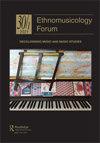Intercultural creativity in the Nigerian-Igbo art music of Okechukwu Ndubuisi
IF 0.5
1区 艺术学
0 MUSIC
引用次数: 0
Abstract
ABSTRACT This article examines the influence of Western art music on the founding of an art music tradition in Nigeria. While the pioneering composers were more Western in approach and style, modern composers’ creative quests for identity and relevance for a local audience have motivated their compositional experiments through intercultural creativity, which Euba [2014. J. H. Kwabena Nketia: Bridging Musicology and Composition. A Study in Creative Musicology. Point Richmond, CA: MRI Press] conceptualised as ‘creative musicology’ or ‘intercultural musicology’. These experiments have resulted in hybrids of Western and indigenous musical features, which in this paper are put in the context of the Igbo ethnic group where Okechukwu Ndubuisi thrived in his art. Indigenous folk music ideals inspired his compositions, which he created with an intercultural approach. This paper has partly emerged from existing studies on Ndubuisi and on intercultural musicology in Africa, and opens new perspectives, for example on pedagogical and performance interculturalism and on Ndubuisi’s creative frameworks, which are omitted both in the literature on him and in other discussions of intercultural and creative musicology in Africa. The study encompasses a sociological argument, theoretical conceptualisation, and musical analysis; it therefore extends the existing scholarship in intercultural and creative musicology.Okechukwu Ndubuisi尼日利亚伊博艺术音乐中的跨文化创造力
摘要本文探讨西方艺术音乐对尼日利亚艺术音乐传统形成的影响。虽然早期的作曲家在方法和风格上更加西方化,但现代作曲家对当地观众身份和相关性的创造性追求激发了他们通过跨文化创造力进行的作曲实验,Euba[2014]。J. H. Kwabena Nketia:连接音乐学和作曲。创造性音乐学研究。(Point Richmond, CA: MRI Press)被概念化为“创造性音乐学”或“跨文化音乐学”。这些实验导致了西方和本土音乐特征的混合,在本文中,这是在伊博民族的背景下,奥克丘库乌·恩杜布西在他的艺术中茁壮成长。土著民族音乐的理想启发了他的作品,他用跨文化的方式创作了这些作品。本文部分源于对恩杜布西和非洲跨文化音乐学的现有研究,并开辟了新的视角,例如教学和表演跨文化主义以及恩杜布西的创作框架,这些在关于他的文献和非洲跨文化和创意音乐学的其他讨论中都被省略了。该研究包括社会学论证、理论概念化和音乐分析;因此,它扩展了现有的跨文化和创造性音乐学学术。
本文章由计算机程序翻译,如有差异,请以英文原文为准。
求助全文
约1分钟内获得全文
求助全文
来源期刊

Ethnomusicology Forum
MUSIC-
CiteScore
1.10
自引率
25.00%
发文量
29
期刊介绍:
Articles often emphasise first-hand, sustained engagement with people as music makers, taking the form of ethnographic writing following one or more periods of fieldwork. Typically, ethnographies aim for a broad assessment of the processes and contexts through and within which music is imagined, discussed and made. Ethnography may be synthesised with a variety of analytical, historical and other methodologies, often entering into dialogue with other disciplinary areas such as music psychology, music education, historical musicology, performance studies, critical theory, dance, folklore and linguistics. The field is therefore characterised by its breadth in theory and method, its interdisciplinary nature and its global perspective.
 求助内容:
求助内容: 应助结果提醒方式:
应助结果提醒方式:


